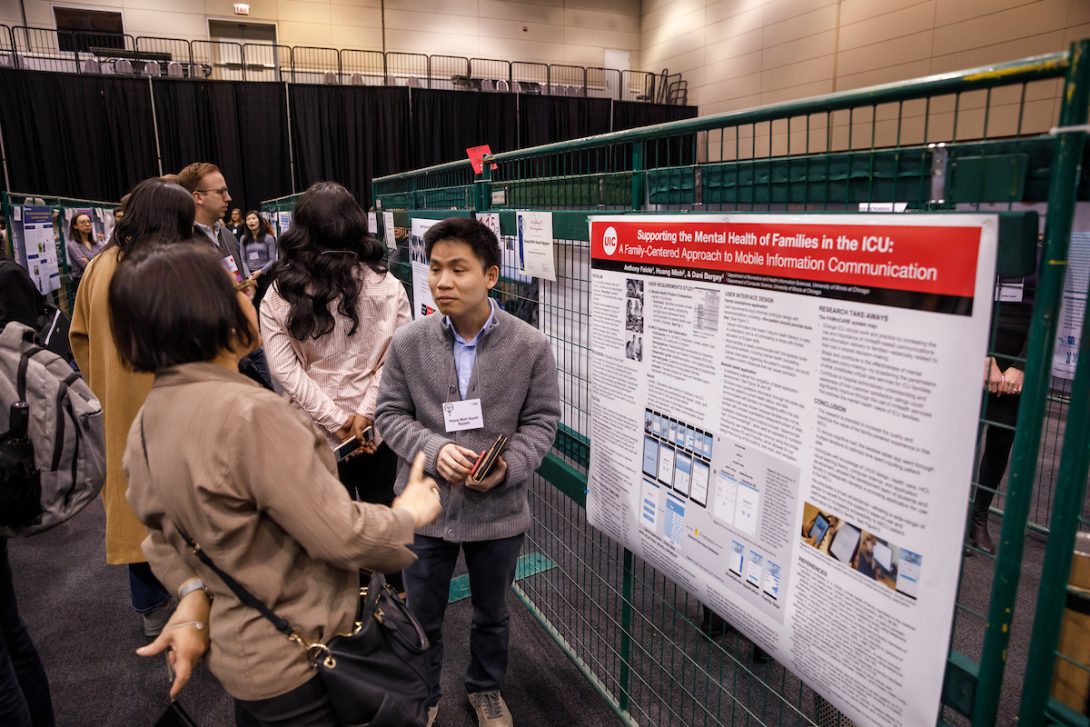Computer science student takes first prize at UIC 2019 Impact and Research Day
Computer science student takes first prize at UIC 2019 Impact and Research Day Heading link

Minh Haong is focused on computer science, but he is attracting attention for his work to improve the hospital experience.
Haong’s work on an app to assist hospital patients and their families caught the eye of judges at UIC’s 2019 Impact and Research Day, and the project, “Supporting the Mental Health of Families in the ICU: A Family-Centered Approach to Mobile Information Communication,” took first place in the Business/Computer Science/Mathematics + Engineering/Physical Sciences category.
Impact and Research Day, a celebration of research across disciplines, involves undergraduate, graduate, and professional students. This year, participants entered more than 350 projects in the form of posters, displays, and oral or other creative presentations.
Hoang and Dani Bergey, a graduate student in biomedical and health information sciences, shared the prize for their work on the app, one of three first-place finishes awarded to graduate students and the only one open to engineering students.
The family-centered care project was started about four years ago by Anthony Faiola, professor and head of the Department of Biomedical and Health Information Sciences, who also holds a courtesy faculty appointment in computer science. Faiola centers much of his work on critical care and the intensive-care unit of hospitals.
“The purpose of the app to address the mental health and trauma families go through when a family member is in the hospital,” Faiola said. “Research shows this is related to a lack of transparency and information. Families visit a patient when they can if they are local, but fear comes from a lack of information.”
Faiola explained that the app is not engaged whatsoever with an electronic medical record; instead a patient’s family receives a code, which connects patients and family members. Qualitative data on about eight or 10 measures such as blood pressure, sleep, temperature, and medication, for example, are relayed: is the patient normal, above normal, or below normal? A chat function allows for texts to be sent back and forth between nurses and family members.
“Minh Hoang’s great work at building the technology of two (interconnected) mobile apps and the back end in the cloud was amazing,” Faiola said. “Dani Bergey’s creative mobile interface design provided an outstanding user interface for ICU families and clinicians,” he added.
Hoang, who first heard Faiola speak in a human augmentics class earlier this year, found out he was looking for help with the app and followed up with him.
“The most challenging thing for me was how to make the app. We had two apps: one for the hospital side and one for the user, and we had to figure out how to make them talk to each other,” Hoang said.
Hoang completed his undergraduate work in Japan and came to UIC because it was one of a handful of universities focused on human-computer interaction. Now, Hoang wants to continue with this work in the healthcare arena.
He plans to stay on with Faiola’s team as the group tests the app first with nurses and then with patients. Hoang also said they may broaden the topic and look at additional technologies in the healthcare setting.
“I’m very happy with the award and to be working on this project,” Hoang said.
You can learn more about the app, FAMmCare, here.